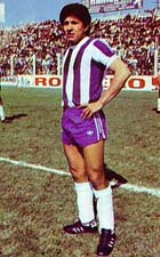
Luis Galván
Encyclopedia
Luis Adolfo Galván is a retired Argentine
Argentina
Argentina , officially the Argentine Republic , is the second largest country in South America by land area, after Brazil. It is constituted as a federation of 23 provinces and an autonomous city, Buenos Aires...
footballer
Football (soccer)
Association football, more commonly known as football or soccer, is a sport played between two teams of eleven players with a spherical ball...
, who played in the centre back position.
He is perhaps most famous for having been part of the 1978 World Cup
1978 FIFA World Cup
The 1978 FIFA World Cup, the 11th staging of the FIFA World Cup, was held in Argentina between 1 June and 25 June. The 1978 World Cup was won by Argentina who beat the Netherlands 3–1 after extra time in the final. This win was the first World Cup title for Argentina, who became the fifth...
winning team.
International career
Galván played his first game of his 8 year international career for ArgentinaArgentina national football team
The Argentina national football team represents Argentina in association football and is controlled by the Argentine Football Association , the governing body for football in Argentina. Argentina's home stadium is Estadio Monumental Antonio Vespucio Liberti and their head coach is Alejandro...
in 1975.
The indisputable highlight of his footballing career came in 1978 when he was selected to represent Argentina at the Argentina 78 tournament. He was lucky enough to play in the World Cup Final in the Monumental, where Argentina beat Holland 3-1 after extra time, to win their first World Cup.
Galván was selected to play for Argentina at Spain 82, but the albicelestes had a disappointing campeign, eliminated in the 2nd group phase. He retired from international football one year later, in 1983 at the age of 35. Galván made a total of 34 appearances for Argentina
Club career
Galván started his career in 1970 at Talleres de CórdobaTalleres de Córdoba
Club Atlético Talleres is a sports club from the city of Córdoba, Argentina, mostly known for its professional football team, which currently plays in the regionalised third division, the Torneo Argentino A...
, the club where he spent the majority of his career. He never won a major trophy with the club but did help Talleres achieve second (1977) and fourth place (1976, 1978) in the Nacional Championship, and third place (1980) in the Metropolitano Championship. The Metropolitano and Nacional championships were Argentine football tournaments that existed between 1967 and 1984. The Metropolitano formed one half of the Argentine 1st division taking place in the first half of the year, while the Nacional took place in the 2nd half of the year.
Galván left the Talleres in 1982 after giving a 12 year service to the club, and went on to play for a string of provincial teams including Talleres' main rivals Belgrano de Córdoba
Belgrano de Córdoba
Club Atlético Belgrano is a sport club from Córdoba, Argentina, best known for its football team, promoted to the Argentine first division at the end of the 2010/2011 season. The football team is very popular and it has one of the largest fan bases outside Buenos Aires...
.
In 1986 Galván moved to Bolivia
Bolivia
Bolivia officially known as Plurinational State of Bolivia , is a landlocked country in central South America. It is the poorest country in South America...
to play for Bolívar
Club Bolívar
Club Bolívar, a football team from Bolivia, was founded in La Paz on April 12, 1925, with the name Atletico Bolívar Literario Musical later changed to "Club Atlético Bolívar"...
in La Paz
La Paz
Nuestra Señora de La Paz is the administrative capital of Bolivia, as well as the departmental capital of the La Paz Department, and the second largest city in the country after Santa Cruz de la Sierra...
, but his stay there didn't last long, and he returned to play for Talleres in 1987. He left professional football to play for Sportivo Fernandez in his home province of Santiago del Estero in 1988, and finally for Talleres de Jesus Maria in 1989, where he retired from football at the age of 41.

